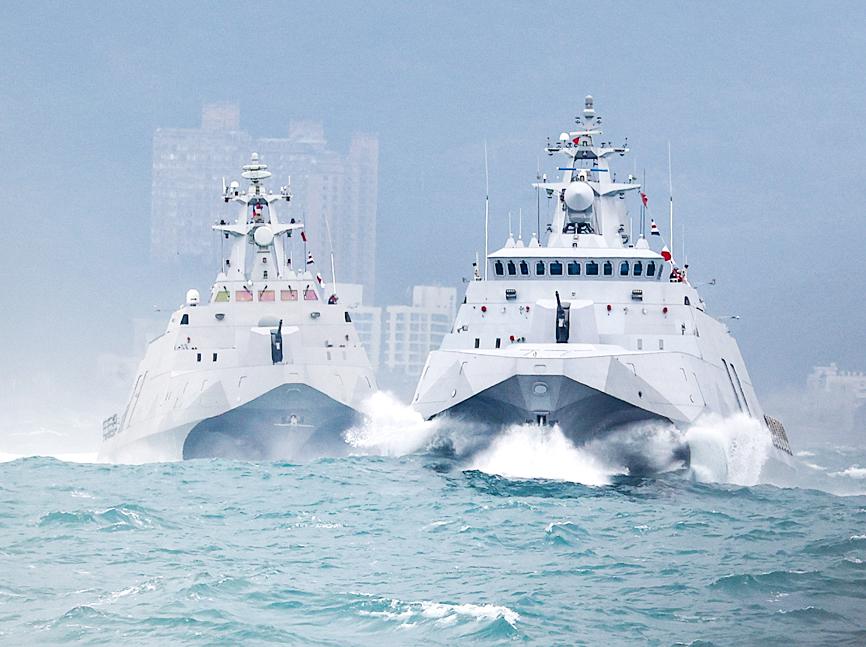The military exercises that Beijing started last week show that Taiwan cannot rely only on asymmetric warfare to deter a Chinese attack, but rather needs to strike a balance between the deployment of military weapons and the development of strategies and tactics to deal with different types of warfare, military experts said.
The Chinese People’s Liberation Army (PLA) launched the exercises around Taiwan on Thursday last week in response to a 19-hour visit by US House of Representatives Speaker Nancy Pelosi to the nation.
During the drills, China fired 11 Dongfeng short-range ballistic missiles into the waters off Taiwan, while warships and fighter jets maneuvered around the nation and crossed the median line of the Taiwan Strait.

Photo: CNA
Taiwan’s navy has focused on the development of small ships such as Tuo Chiang-class corvettes.
However, when the navy monitored Chinese military movements at close range during the exercises, it became apparent that the tonnage of the vessels was much smaller than that of Chinese ships, which triggered discussions on asymmetric warfare strategies.
Lin Ying-yu (林穎佑), an assistant professor in Tamkang University’s Graduate Institute of International Affairs and Strategic Studies, on Monday said the drills demonstrate that Taiwan’s armed forces need to adjust their buildup.
For instance, if the PLA continues to use vessels and aircraft to pressure Taiwan, the navy would need medium and large-tonnage ships to effectively counter Chinese ships, and secure Taiwan’s sea power and lines of communication at sea, while simultaneously developing asymmetric combat capabilities, Lin said.
Separately, former navy lieutenant commander Lu Li-shih (呂禮詩) said Taiwan’s long-term development of small ships such as the corvettes could put naval troops at a disadvantage in a potential combat with larger Chinese vessels.
The navy should build ships that are heavier than 4,000 tonnes, he said.
When China conducted “gray-zone” operations against Taiwan during the drills, the navy was barely able to respond, Lu said, adding that the nation must develop new military methods and avoid adopting a “one-on-one” surveillance war of attrition approach.
However, Taiwan should not return to its old way of thinking, which focused on building up large-scale weapons systems or adopting asymmetric operations, but rather adopt a balanced strategy to deal with different forms of warfare, Lu said.
China’s intensive live-fire military exercises around Taiwan last week provided an excellent opportunity to review the nation’s military strategy and defensive tactics, said Shen Ming-shih (沈明室), director of the Division of National Security Research at the Institute for National Defense and Security Research.
Russia’s war on Ukraine has encouraged Taiwan to believe that urban guerrilla warfare is a feasible combat approach, Shen said.
However, the PLA recognizes that urban fighting could result in a large number of casualties, therefore adopting a blockade and encirclement strategy against Taiwan, as practiced during the drills, he said.
In response to claims that one of the objectives of the Chinese drills was to shatter a tacit mutual understanding that both sides only conduct drills on their side of the median line, Shen offered a different opinion.
A flight path map for PLA aircraft released by Taiwan’s air force showed that Chinese warplanes flew “back and forth” across the median line, he said.
This shows that although China does not recognize the median line, it remains concerned about possible military countermeasures by Taiwan.
Separately, Ministry of National Defense Operations and Planning Division head Yeh Gou-huei (葉國輝) told a news conference that asymmetric operations should not only involve building weapon platforms, but also evolving different strategic and tactical approaches.

Three Taiwanese airlines have prohibited passengers from packing Bluetooth earbuds and their charger cases in checked luggage. EVA Air and Uni Air said that Bluetooth earbuds and charger cases are categorized as portable electronic devices, which should be switched off if they are placed in checked luggage based on international aviation safety regulations. They must not be in standby or sleep mode. However, as charging would continue when earbuds are placed in the charger cases, which would contravene international aviation regulations, their cases must be carried as hand luggage, they said. Tigerair Taiwan said that earbud charger cases are equipped

Foreign travelers entering Taiwan on a short layover via Taiwan Taoyuan International Airport are receiving NT$600 gift vouchers from yesterday, the Tourism Administration said, adding that it hopes the incentive would boost tourism consumption at the airport. The program, which allows travelers holding non-Taiwan passports who enter the country during a layover of up to 24 hours to claim a voucher, aims to promote attractions at the airport, the agency said in a statement on Friday. To participate, travelers must sign up on the campaign Web site, the agency said. They can then present their passport and boarding pass for their connecting international

Temperatures in northern Taiwan are forecast to reach as high as 30°C today, as an ongoing northeasterly seasonal wind system weakens, the Central Weather Administration (CWA) said. CWA forecaster Tseng Chao-cheng (曾昭誠) said yesterday that with the seasonal wind system weakening, warmer easterly winds would boost the temperature today. Daytime temperatures in northern Taiwan and Yilan County are expected to range from 28°C to 30°C today, up about 3°C from yesterday, Tseng said. According to the CWA, temperature highs in central and southern Taiwan could stay stable. However, the weather is expected to turn cooler starting tonight as the northeasterly wind system strengthens again

Taiwan sweltered through its hottest October on record, the Central Weather Administration (CWA) said yesterday, the latest in a string of global temperature records. The main island endured its highest average temperature since 1950, CWA forecaster Liu Pei-teng said. Temperatures the world over have soared in recent years as human-induced climate change contributes to ever more erratic weather patterns. Taiwan’s average temperature was 27.381°C as of Thursday, Liu said. Liu said the average could slip 0.1°C by the end of yesterday, but it would still be higher than the previous record of 27.009°C in 2016. "The temperature only started lowering around Oct. 18 or 19